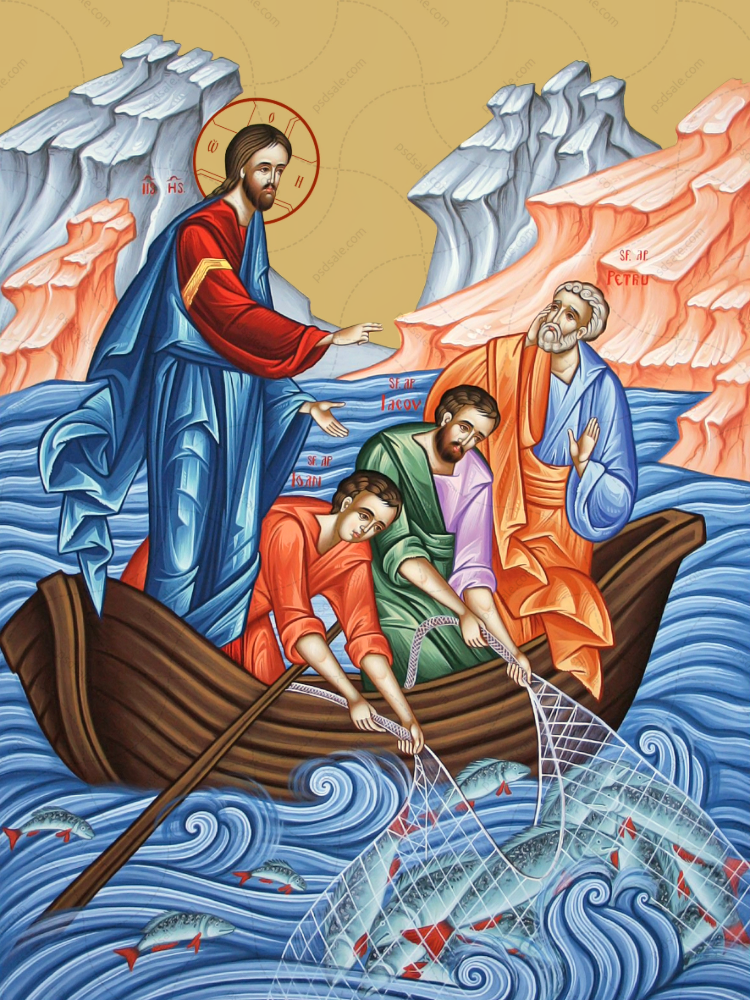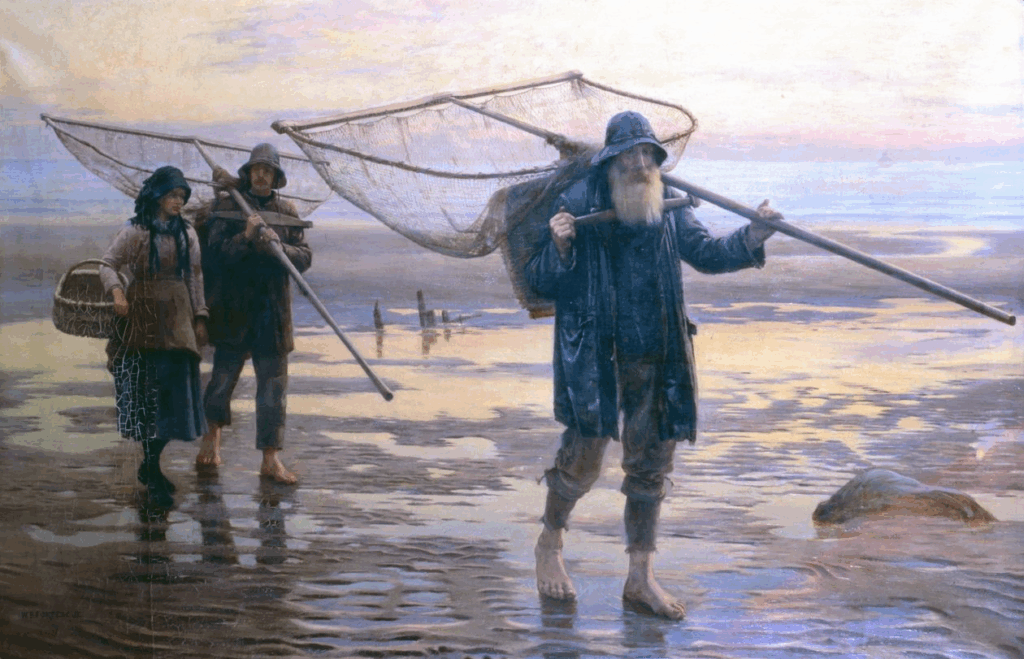Translation of the Holy Gospel According to Luke (Luke 5:1-11)
At that time, when the multitude pressed upon Jesus to hear the word of God, He stood by the lake of Genesareth. And He saw two ships standing by the lake; but the fishermen were gone out of them, and were washing their nets. And going up into one of the ships that was Simon’s, He desired him to draw back a little from the land: and sitting He taught the multitudes out of the ship. Now when He had ceased to speak, He said to Simon: Launch out into the deep, and let down your nets for a draught. And Simon, answering, said to Him: Master, we have labored all the night, and have taken nothing, but at Thy word I will let down the net. And when they had done this, they enclosed a very great multitude of fishes and their net broke: and they beckoned to their partners that were in the other ship, that they should come and help them and they came, and filled both the ships, so that they were almost sinking. Which when Simon Peter saw, he fell down at Jesus’ knees, saying: Depart from me, for I am a sinful man, O Lord. For he was wholly astonished, and all that were with him, at the draught of fishes which they had taken: and so were also James and John the sons of Zebedee, who were Simon’s partners. And Jesus saith to Simon: Fear not, from henceforth thou shalt catch men. And having brought their ships to land, leaving all things, they followed Him.
A Message From St. Antony of Padua’s Sermons, “Fifth Sunday After Pentecost,” IV Clause
Which when Simon Peter saw, he fell down at Jesus’ knees, saying: Depart from me, for I am a sinful man, O Lord. For he was wholly astonished, and all that were with him, at the draught of fishes which they had taken. And so were also James and John, the sons of Zebedee, who were Simon’s partners. And Jesus saith to Simon: Fear not: from henceforth thou shalt catch men. And having brought their ships to land, leaving all things, they followed him. (Luke 5:8-11)
Peter, knowing himself to be a sinner, was afraid of offending the presence of so great a majesty, and that is why he said: Depart from me, for I am a sinful man, O Lord.
Because he knew he was a sinner, he threw himself at Jesus’ knees. There are two things to note here: fear for sin, expressed in He fell down; and hope in the Redeemer’s mercy, expressed by at Jesus’ knees. The Lord promised such sinners, by Isaiah:
You shall be carried at the breasts, and upon the knees, they shall caress you. (Isa 66:12)
The breasts, flowing with milk, are two in number. They refer to the Incarnation and the Passion. The first brings comfort, the second reconciliation. Newly converted penitents are like sucking babes, carried at the breasts, so as to be comforted with the milk of the Incarnation, and given life and reconciliation by the blood which flowed from his breast when it was pierced by the lance on Mount Calvary, so that they may bear suffering.
They are caressed upon the knees of the Father’s kindness, as a mother caresses her child, so that they may trust most surely that he will not deny remission of sins and the bliss of the kingdom to those he has given the breasts of the Incarnation and the Passion.
He said, then: Depart from me, Lord, etc.
Given so great a benefit, where nowadays is the man who fears to offend? Peter was afraid; but we, conscious of so many crimes, approach without reverence the presence of the divine majesty, and are not afraid. The presence of the divine majesty is where the Body of Christ, glory of the angels, is; where the Church’s sacraments are; where the holy Mysteries are handled. We believe in these things, but, obstinate in our ill-will, we do not stop sinning. That is why the Lord says through Jeremiah:
What is the meaning that my beloved hath wrought much wickedness in my house? Shall the holy flesh take away from thee thy crimes in which thou hast boasted? (Jer 11:15)
Certainly not- rather it will increase them.
He was wholly astonished.
Peter and his companions were astonished at so great a catch of fish. We, too, should be astonished at the conversion of sinners, like those spoken of in the book of Judges, because
Samson made a great slaughter of the Philistines, so that in astonishment they laid the calf of the leg upon the thigh. (Jud 15:8)
The calf is the back of the lower leg. When the Lord strikes the Philistines (the demons) and frees Israel (the soul) from their hands, we should be astonished and lay the calf upon the thigh. The thigh stands for fleshly pleasure, and we should lay the calf upon it by following the example of converted sinners and repressing bodily pleasure with bodily penance.
Fear not: from henceforth thou shalt catch men.
From henceforth refers to Peter in particular, when the meaning of the catch of fish was explained to him. Just as he once caught fish with a net, so now he would catch men with his words. Alternatively, From henceforward means, from being humble and ashamed of the blemishes of your life, yet not too ashamed to confess them, but rather seeking a remedy for your open wound: from this you will catch men.
And having brought their ships to land, leaving all things, they followed him.
Christ,
A giant in two-fold substance one, / rejoicing now his course to run, (cf. Veni redemptor gentium)
rejoiced to run the way (Psa 18:6), and to complete the task for which He had come. Whoever wants to follow Him must forsake everything, casting everything aside and leaving it behind. A burdened man cannot follow a running man. So it says in the third book of Kings:
The hand of the Lord was upon Elias: and he girded up his loins and ran. (1 Kings 18:46)
The hand of God means his help, his grace. When it is upon a man, it gives him such great help that, as it were with loins girded, he runs in chastity; and by poverty, he naked follows the naked Christ, poor follows the poor Christ (Franciscanism — from nudus nudum Christum sequi — St. Jerome).



